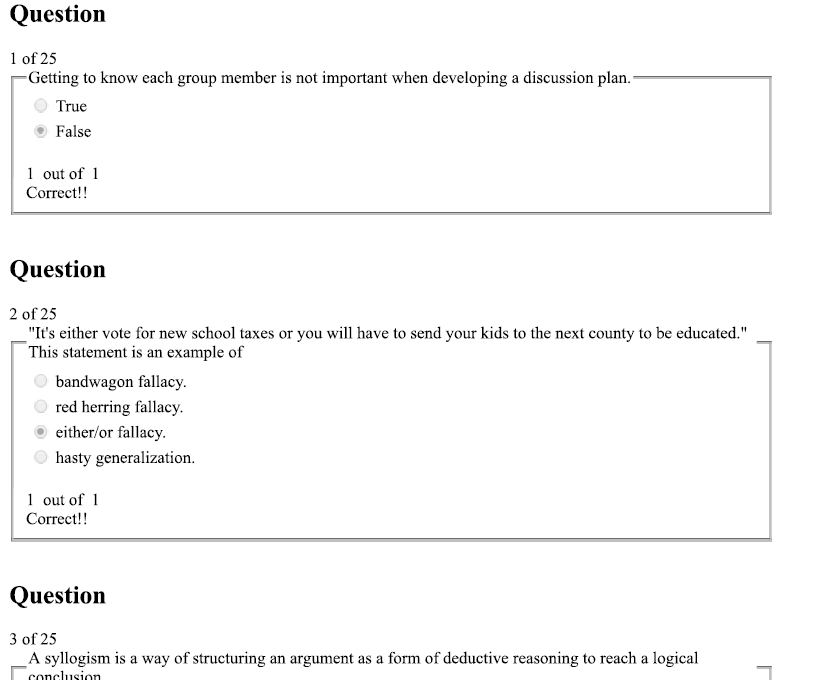(Solved): COM 230 Lesson 4 Quiz : Mar 25, 2020 : Scored 25 out of 25 , 100% ...
COM 230 Lesson 4 Quiz
Mar 25, 2020
Total Scored 25 out of 25 , 100%
Question
1 of 25
Getting to know each group member is not important when developing a discussion plan.
- True
- False
Question
2 of 25
"It's either vote for new school taxes or you will have to send your kids to the next county to be educated. "
This statement is an example of
- bandwagon fallacy.
- red herring fallacy.
- either/or fallacy.
- hasty generalization.
Question
3 of 25
A syllogism is a way of structuring an argument as a form of deductive reasoning to reach a logical conclusion.
- True
- False
Question
4 of 25
A question that asks about a course of action or a change in procedure or behavior is a question of fact.
- True
- False
Question
5 of 25
Which of the following is not one of the tests for evaluating evidence?
- credibility
- fallacies
- reliability
- accuracy
Question
6 of 25
A question that asks whether something is good or bad or right or wrong is a question of value.
- True
- False
Question
7 of 25
As you develop a coordinated plan for the group you will be more effective and efficient if you
- focus on the purpose of the project.
- encourage all members to participate.
- establish a timeline for completion.
- do all of the above.
Question
8 of 25
Content of a website should be evaluated in terms of
- accuracy.
- formatting.
- author's picture.
- complementary colors.
Question
9 of 25
"Did the university officials violate the freshman-admissions policy last year?" is an example of a question of
- fact.
- prediction.
- value.
- policy.
Question
10 of 25
An agenda includes a list of topics or tasks to be discussed or completed in a meeting.
- True
- False
Question
11 of 25
Developing a discussion, a collaborative plan to accomplish work, results in higher- quality results.
- True
- False
Question
12 of 25
Sharing personal information in a group setting can establish a climate of
- support.
- defense.
- empathy.
- hierarchy.
Question
13 of 25
Deductive reasoning starts with a known claim or general belief, and from there determines what follows.
- True
- False
Question
14 of 25
"What should be done to curtail gang violence in the community?" is an example of a question of
- prediction.
- fact.
- policy.
- value.
Question
15 of 25
Inductive reasoning is a method of reasoning for arriving at a broad inference through the use of specific instances or examples.
- True
- False
Question
16 of 25
Deductive reasoning contains only two parts, major premise and minor premise.
- True
- False
Question
17 of 25
Research in small group communication consistently shows that group members work better together when
- people play similar roles.
- the organization governs their choices.
- they know a little bit about each other.
- goals are flexible.
Question
18 of 25
Attacking the person is a fallacy that is also known as ad hominem, which is Latin for "to the man".
- True
- False
Question
19 of 25
Before you start surfing the Internet for information, you should find out what you and your group members know about
- small group communication.
- political climate.
- timeline
- topic and issues.
Question
20 of 25
Group goals tend to boil down to all of the following EXCEPT
- coming up with ideas to solve a problem.
- deciding on the "how" for solving a problem.
- voting on members in the group.
- formulating an idea into action to solve a problem.
Question
21 of 25
A fallacy is reasoning that takes place when someone tries to persuade with adequate evidence or with discussions that are relevant and appropriate.
- True
- False
Question
22 of 25
Reasoning is the process of drawing information from conclusion.
- True
- False
Question
23 of 25
An advantage of group members sharing what they know is
- more overall satisfaction with the group.
- less clique behavior in the group.
- more tension.
- bypassing problem-solving techniques.
Question
24 of 25
A question that asks whether something is likely to occur under certain circumstances is a question of value.
- True
- False
Question
25 of 25
When the group starts to get off track, group members need to be pointed back to the
- leader of the discussion.
- central reason for the discussion.
- bylaws of the meeting.
- refreshment table.
Expert Answer

Buy This Answer $15
-- OR --
Subscribe $20 / Month
